Reward Management: Stakeholder Perspectives and Wage Determination
VerifiedAdded on 2020/05/11
|11
|2682
|209
Report
AI Summary
This report delves into the multifaceted realm of reward management, focusing on the perspectives of various stakeholders within a business context, particularly in the Australian framework. It examines the contrasting theoretical approaches to minimum wage determination, including the influence of the Fair Work Act (FWA) and the roles of entities like the Fair Work Commission (FWC) in setting national minimum wage orders. The analysis explores the impact of collective bargaining, wage theories, and the economic environment on wage structures. The report highlights the views of stakeholders such as ACTU and employer organizations, and how their approaches align with contemporary reward management practices. The report also explores the role of the Fair Work Act, collective bargaining, wage theories, and the economic environment on wage structures, considering the viewpoints of stakeholders like ACTU and employer organizations. It concludes by assessing the extent to which these diverse stakeholder approaches align with contemporary reward management principles, emphasizing the importance of employee satisfaction, productivity, and economic prosperity.
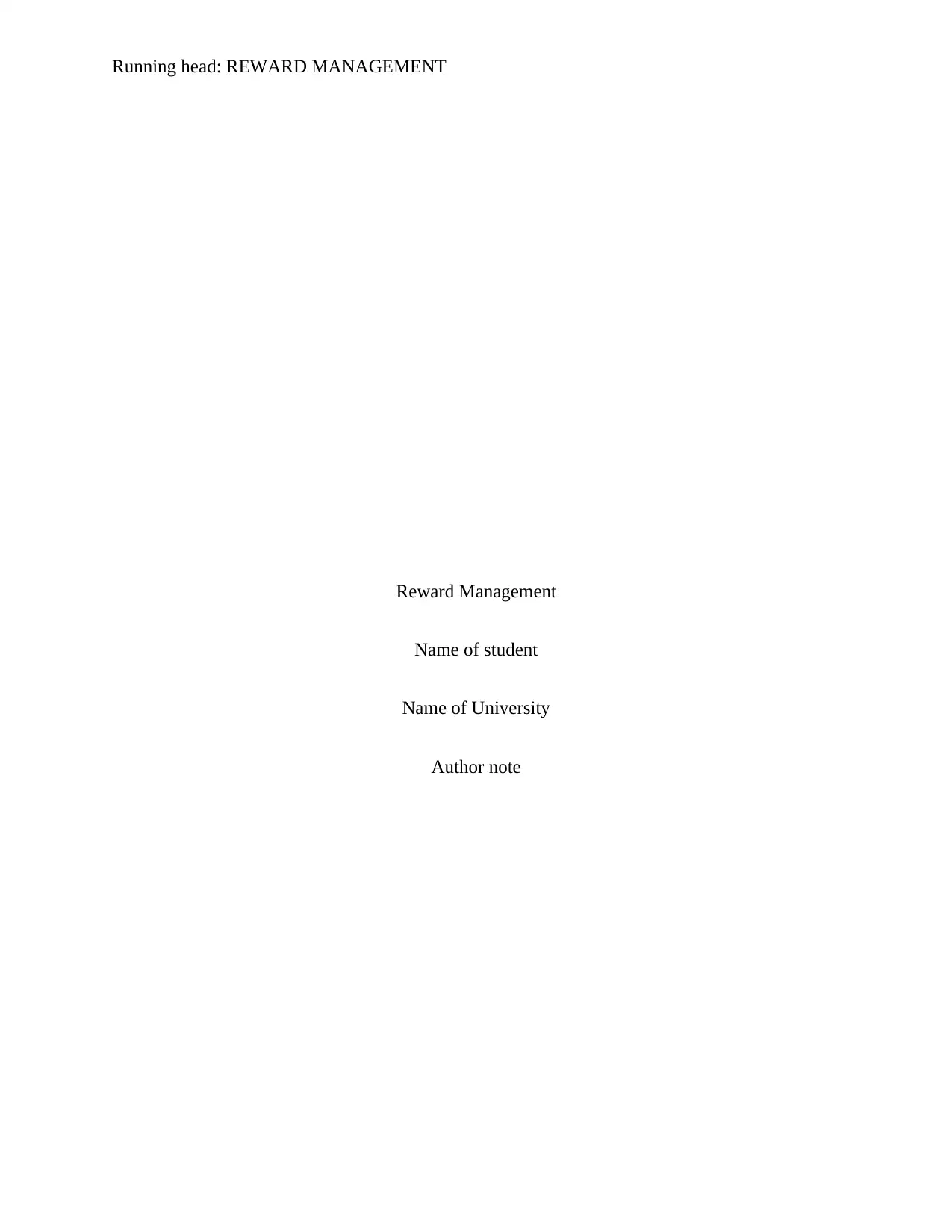
Running head: REWARD MANAGEMENT
Reward Management
Name of student
Name of University
Author note
Reward Management
Name of student
Name of University
Author note
Paraphrase This Document
Need a fresh take? Get an instant paraphrase of this document with our AI Paraphraser
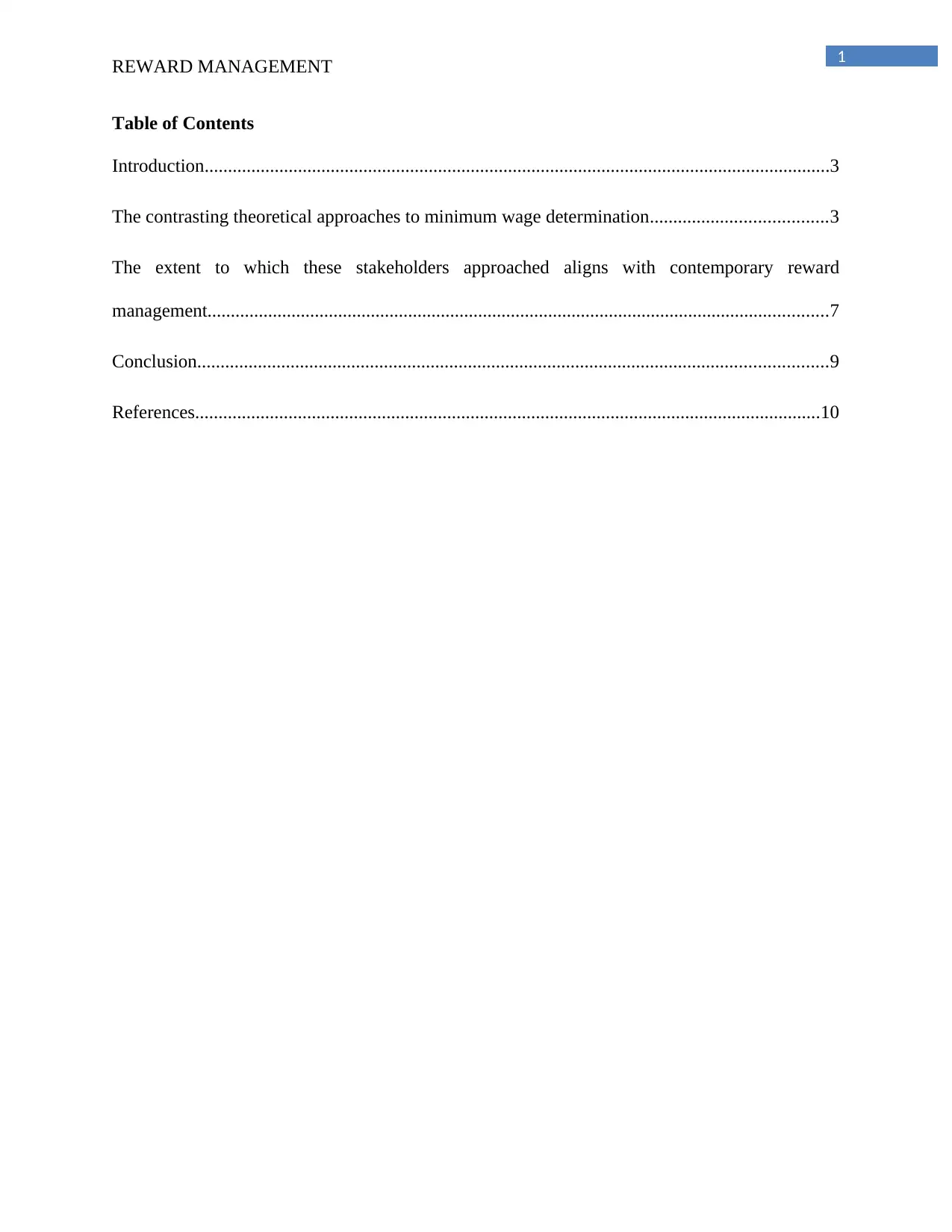
1
REWARD MANAGEMENT
Table of Contents
Introduction......................................................................................................................................3
The contrasting theoretical approaches to minimum wage determination......................................3
The extent to which these stakeholders approached aligns with contemporary reward
management.....................................................................................................................................7
Conclusion.......................................................................................................................................9
References......................................................................................................................................10
REWARD MANAGEMENT
Table of Contents
Introduction......................................................................................................................................3
The contrasting theoretical approaches to minimum wage determination......................................3
The extent to which these stakeholders approached aligns with contemporary reward
management.....................................................................................................................................7
Conclusion.......................................................................................................................................9
References......................................................................................................................................10
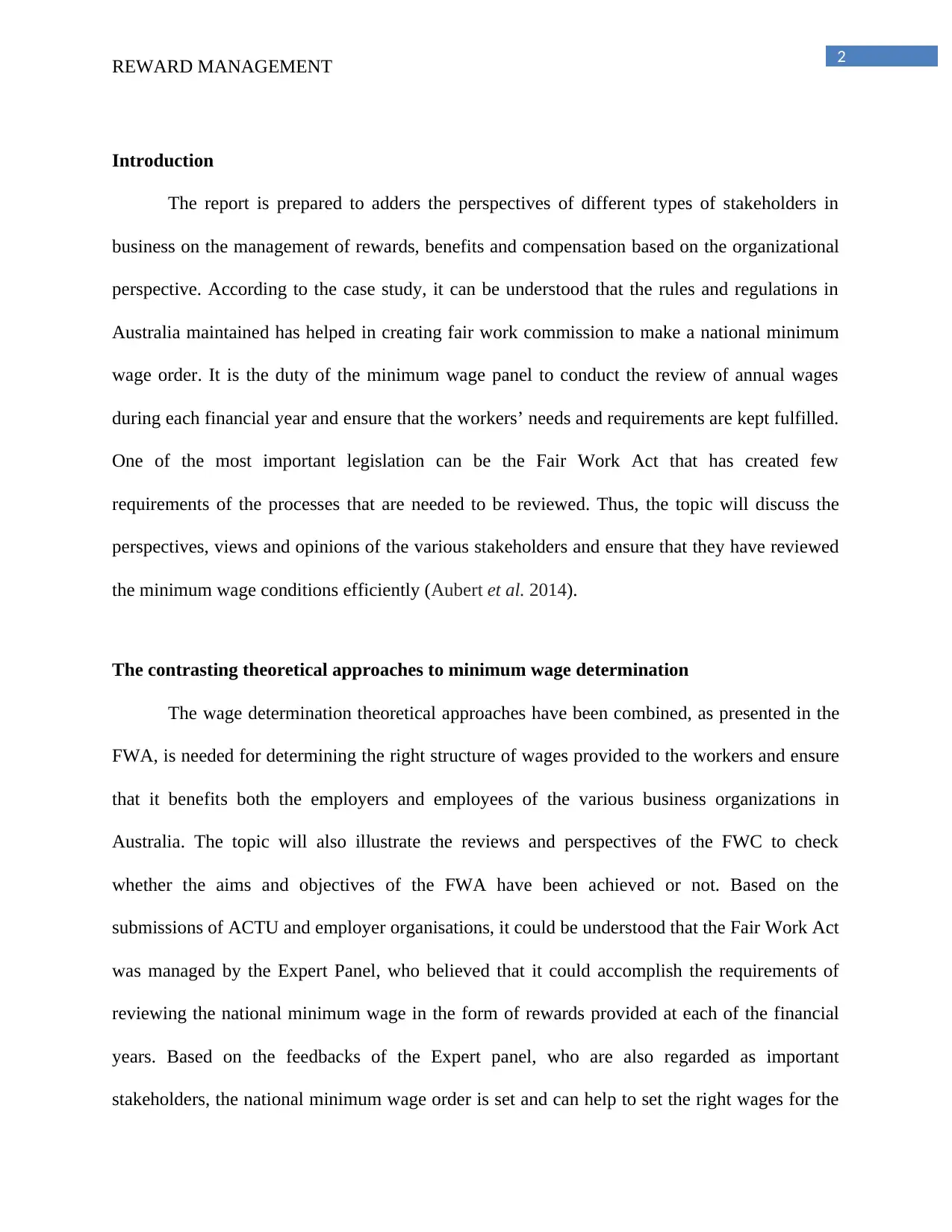
2
REWARD MANAGEMENT
Introduction
The report is prepared to adders the perspectives of different types of stakeholders in
business on the management of rewards, benefits and compensation based on the organizational
perspective. According to the case study, it can be understood that the rules and regulations in
Australia maintained has helped in creating fair work commission to make a national minimum
wage order. It is the duty of the minimum wage panel to conduct the review of annual wages
during each financial year and ensure that the workers’ needs and requirements are kept fulfilled.
One of the most important legislation can be the Fair Work Act that has created few
requirements of the processes that are needed to be reviewed. Thus, the topic will discuss the
perspectives, views and opinions of the various stakeholders and ensure that they have reviewed
the minimum wage conditions efficiently (Aubert et al. 2014).
The contrasting theoretical approaches to minimum wage determination
The wage determination theoretical approaches have been combined, as presented in the
FWA, is needed for determining the right structure of wages provided to the workers and ensure
that it benefits both the employers and employees of the various business organizations in
Australia. The topic will also illustrate the reviews and perspectives of the FWC to check
whether the aims and objectives of the FWA have been achieved or not. Based on the
submissions of ACTU and employer organisations, it could be understood that the Fair Work Act
was managed by the Expert Panel, who believed that it could accomplish the requirements of
reviewing the national minimum wage in the form of rewards provided at each of the financial
years. Based on the feedbacks of the Expert panel, who are also regarded as important
stakeholders, the national minimum wage order is set and can help to set the right wages for the
REWARD MANAGEMENT
Introduction
The report is prepared to adders the perspectives of different types of stakeholders in
business on the management of rewards, benefits and compensation based on the organizational
perspective. According to the case study, it can be understood that the rules and regulations in
Australia maintained has helped in creating fair work commission to make a national minimum
wage order. It is the duty of the minimum wage panel to conduct the review of annual wages
during each financial year and ensure that the workers’ needs and requirements are kept fulfilled.
One of the most important legislation can be the Fair Work Act that has created few
requirements of the processes that are needed to be reviewed. Thus, the topic will discuss the
perspectives, views and opinions of the various stakeholders and ensure that they have reviewed
the minimum wage conditions efficiently (Aubert et al. 2014).
The contrasting theoretical approaches to minimum wage determination
The wage determination theoretical approaches have been combined, as presented in the
FWA, is needed for determining the right structure of wages provided to the workers and ensure
that it benefits both the employers and employees of the various business organizations in
Australia. The topic will also illustrate the reviews and perspectives of the FWC to check
whether the aims and objectives of the FWA have been achieved or not. Based on the
submissions of ACTU and employer organisations, it could be understood that the Fair Work Act
was managed by the Expert Panel, who believed that it could accomplish the requirements of
reviewing the national minimum wage in the form of rewards provided at each of the financial
years. Based on the feedbacks of the Expert panel, who are also regarded as important
stakeholders, the national minimum wage order is set and can help to set the right wages for the
⊘ This is a preview!⊘
Do you want full access?
Subscribe today to unlock all pages.

Trusted by 1+ million students worldwide
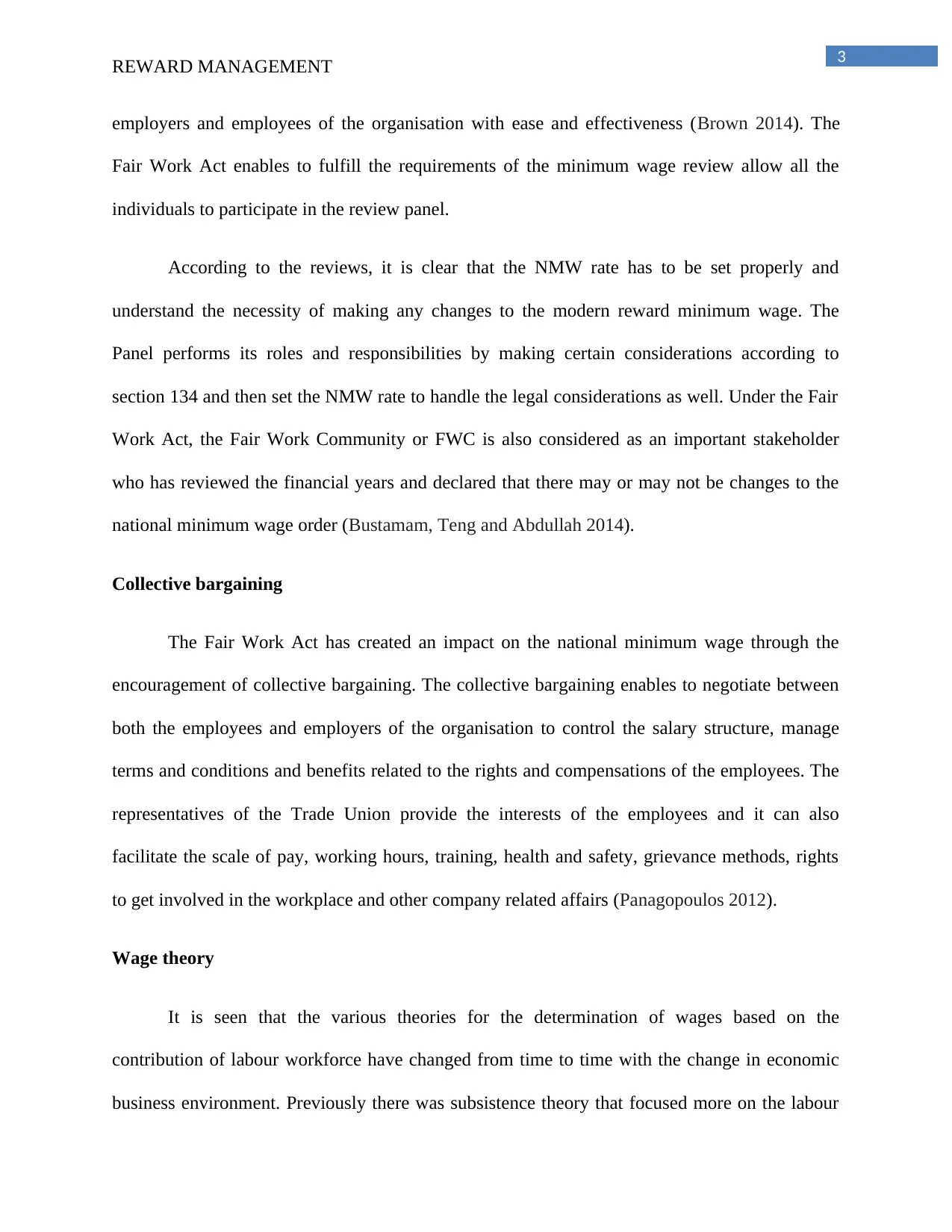
3
REWARD MANAGEMENT
employers and employees of the organisation with ease and effectiveness (Brown 2014). The
Fair Work Act enables to fulfill the requirements of the minimum wage review allow all the
individuals to participate in the review panel.
According to the reviews, it is clear that the NMW rate has to be set properly and
understand the necessity of making any changes to the modern reward minimum wage. The
Panel performs its roles and responsibilities by making certain considerations according to
section 134 and then set the NMW rate to handle the legal considerations as well. Under the Fair
Work Act, the Fair Work Community or FWC is also considered as an important stakeholder
who has reviewed the financial years and declared that there may or may not be changes to the
national minimum wage order (Bustamam, Teng and Abdullah 2014).
Collective bargaining
The Fair Work Act has created an impact on the national minimum wage through the
encouragement of collective bargaining. The collective bargaining enables to negotiate between
both the employees and employers of the organisation to control the salary structure, manage
terms and conditions and benefits related to the rights and compensations of the employees. The
representatives of the Trade Union provide the interests of the employees and it can also
facilitate the scale of pay, working hours, training, health and safety, grievance methods, rights
to get involved in the workplace and other company related affairs (Panagopoulos 2012).
Wage theory
It is seen that the various theories for the determination of wages based on the
contribution of labour workforce have changed from time to time with the change in economic
business environment. Previously there was subsistence theory that focused more on the labour
REWARD MANAGEMENT
employers and employees of the organisation with ease and effectiveness (Brown 2014). The
Fair Work Act enables to fulfill the requirements of the minimum wage review allow all the
individuals to participate in the review panel.
According to the reviews, it is clear that the NMW rate has to be set properly and
understand the necessity of making any changes to the modern reward minimum wage. The
Panel performs its roles and responsibilities by making certain considerations according to
section 134 and then set the NMW rate to handle the legal considerations as well. Under the Fair
Work Act, the Fair Work Community or FWC is also considered as an important stakeholder
who has reviewed the financial years and declared that there may or may not be changes to the
national minimum wage order (Bustamam, Teng and Abdullah 2014).
Collective bargaining
The Fair Work Act has created an impact on the national minimum wage through the
encouragement of collective bargaining. The collective bargaining enables to negotiate between
both the employees and employers of the organisation to control the salary structure, manage
terms and conditions and benefits related to the rights and compensations of the employees. The
representatives of the Trade Union provide the interests of the employees and it can also
facilitate the scale of pay, working hours, training, health and safety, grievance methods, rights
to get involved in the workplace and other company related affairs (Panagopoulos 2012).
Wage theory
It is seen that the various theories for the determination of wages based on the
contribution of labour workforce have changed from time to time with the change in economic
business environment. Previously there was subsistence theory that focused more on the labour
Paraphrase This Document
Need a fresh take? Get an instant paraphrase of this document with our AI Paraphraser
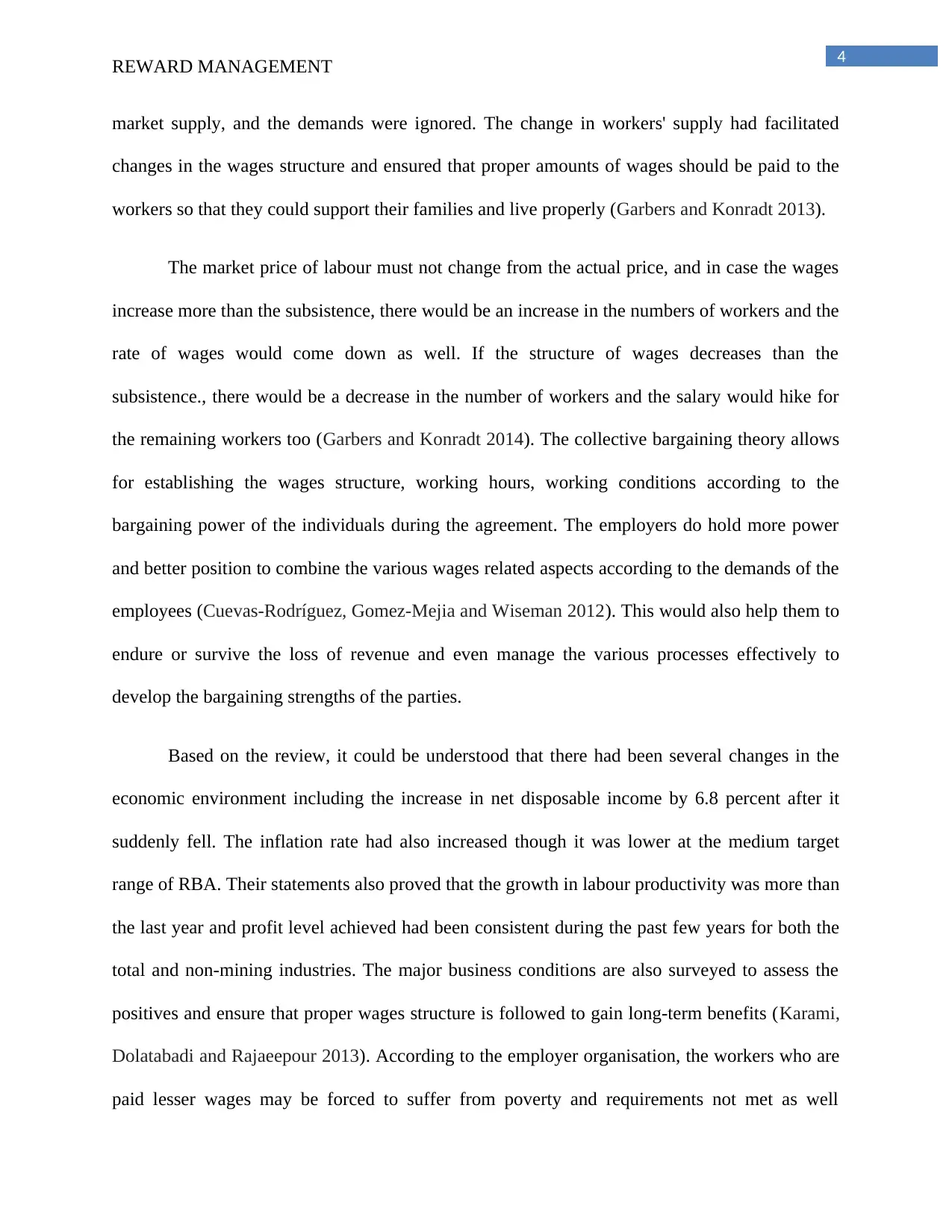
4
REWARD MANAGEMENT
market supply, and the demands were ignored. The change in workers' supply had facilitated
changes in the wages structure and ensured that proper amounts of wages should be paid to the
workers so that they could support their families and live properly (Garbers and Konradt 2013).
The market price of labour must not change from the actual price, and in case the wages
increase more than the subsistence, there would be an increase in the numbers of workers and the
rate of wages would come down as well. If the structure of wages decreases than the
subsistence., there would be a decrease in the number of workers and the salary would hike for
the remaining workers too (Garbers and Konradt 2014). The collective bargaining theory allows
for establishing the wages structure, working hours, working conditions according to the
bargaining power of the individuals during the agreement. The employers do hold more power
and better position to combine the various wages related aspects according to the demands of the
employees (Cuevas‐Rodríguez, Gomez‐Mejia and Wiseman 2012). This would also help them to
endure or survive the loss of revenue and even manage the various processes effectively to
develop the bargaining strengths of the parties.
Based on the review, it could be understood that there had been several changes in the
economic environment including the increase in net disposable income by 6.8 percent after it
suddenly fell. The inflation rate had also increased though it was lower at the medium target
range of RBA. Their statements also proved that the growth in labour productivity was more than
the last year and profit level achieved had been consistent during the past few years for both the
total and non-mining industries. The major business conditions are also surveyed to assess the
positives and ensure that proper wages structure is followed to gain long-term benefits (Karami,
Dolatabadi and Rajaeepour 2013). According to the employer organisation, the workers who are
paid lesser wages may be forced to suffer from poverty and requirements not met as well
REWARD MANAGEMENT
market supply, and the demands were ignored. The change in workers' supply had facilitated
changes in the wages structure and ensured that proper amounts of wages should be paid to the
workers so that they could support their families and live properly (Garbers and Konradt 2013).
The market price of labour must not change from the actual price, and in case the wages
increase more than the subsistence, there would be an increase in the numbers of workers and the
rate of wages would come down as well. If the structure of wages decreases than the
subsistence., there would be a decrease in the number of workers and the salary would hike for
the remaining workers too (Garbers and Konradt 2014). The collective bargaining theory allows
for establishing the wages structure, working hours, working conditions according to the
bargaining power of the individuals during the agreement. The employers do hold more power
and better position to combine the various wages related aspects according to the demands of the
employees (Cuevas‐Rodríguez, Gomez‐Mejia and Wiseman 2012). This would also help them to
endure or survive the loss of revenue and even manage the various processes effectively to
develop the bargaining strengths of the parties.
Based on the review, it could be understood that there had been several changes in the
economic environment including the increase in net disposable income by 6.8 percent after it
suddenly fell. The inflation rate had also increased though it was lower at the medium target
range of RBA. Their statements also proved that the growth in labour productivity was more than
the last year and profit level achieved had been consistent during the past few years for both the
total and non-mining industries. The major business conditions are also surveyed to assess the
positives and ensure that proper wages structure is followed to gain long-term benefits (Karami,
Dolatabadi and Rajaeepour 2013). According to the employer organisation, the workers who are
paid lesser wages may be forced to suffer from poverty and requirements not met as well
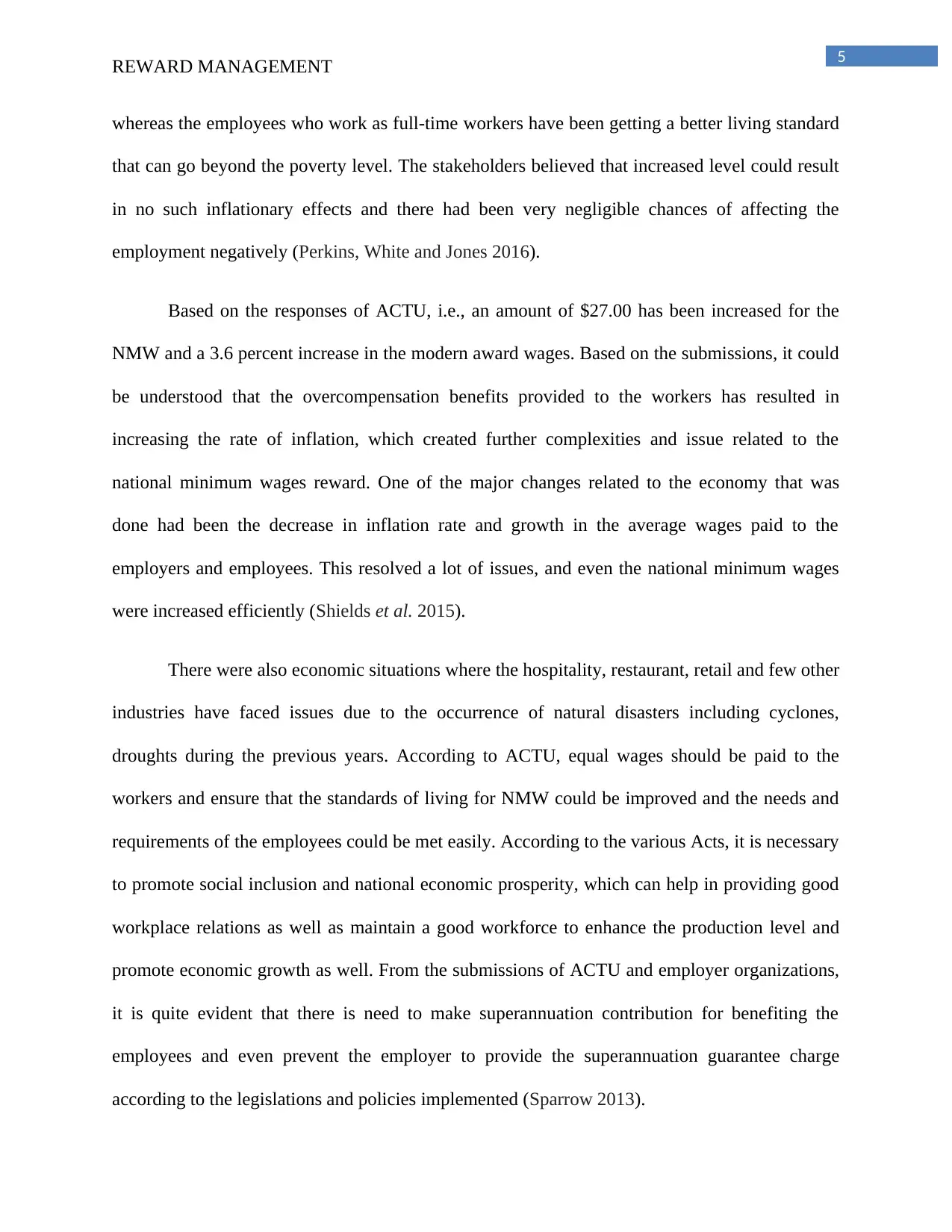
5
REWARD MANAGEMENT
whereas the employees who work as full-time workers have been getting a better living standard
that can go beyond the poverty level. The stakeholders believed that increased level could result
in no such inflationary effects and there had been very negligible chances of affecting the
employment negatively (Perkins, White and Jones 2016).
Based on the responses of ACTU, i.e., an amount of $27.00 has been increased for the
NMW and a 3.6 percent increase in the modern award wages. Based on the submissions, it could
be understood that the overcompensation benefits provided to the workers has resulted in
increasing the rate of inflation, which created further complexities and issue related to the
national minimum wages reward. One of the major changes related to the economy that was
done had been the decrease in inflation rate and growth in the average wages paid to the
employers and employees. This resolved a lot of issues, and even the national minimum wages
were increased efficiently (Shields et al. 2015).
There were also economic situations where the hospitality, restaurant, retail and few other
industries have faced issues due to the occurrence of natural disasters including cyclones,
droughts during the previous years. According to ACTU, equal wages should be paid to the
workers and ensure that the standards of living for NMW could be improved and the needs and
requirements of the employees could be met easily. According to the various Acts, it is necessary
to promote social inclusion and national economic prosperity, which can help in providing good
workplace relations as well as maintain a good workforce to enhance the production level and
promote economic growth as well. From the submissions of ACTU and employer organizations,
it is quite evident that there is need to make superannuation contribution for benefiting the
employees and even prevent the employer to provide the superannuation guarantee charge
according to the legislations and policies implemented (Sparrow 2013).
REWARD MANAGEMENT
whereas the employees who work as full-time workers have been getting a better living standard
that can go beyond the poverty level. The stakeholders believed that increased level could result
in no such inflationary effects and there had been very negligible chances of affecting the
employment negatively (Perkins, White and Jones 2016).
Based on the responses of ACTU, i.e., an amount of $27.00 has been increased for the
NMW and a 3.6 percent increase in the modern award wages. Based on the submissions, it could
be understood that the overcompensation benefits provided to the workers has resulted in
increasing the rate of inflation, which created further complexities and issue related to the
national minimum wages reward. One of the major changes related to the economy that was
done had been the decrease in inflation rate and growth in the average wages paid to the
employers and employees. This resolved a lot of issues, and even the national minimum wages
were increased efficiently (Shields et al. 2015).
There were also economic situations where the hospitality, restaurant, retail and few other
industries have faced issues due to the occurrence of natural disasters including cyclones,
droughts during the previous years. According to ACTU, equal wages should be paid to the
workers and ensure that the standards of living for NMW could be improved and the needs and
requirements of the employees could be met easily. According to the various Acts, it is necessary
to promote social inclusion and national economic prosperity, which can help in providing good
workplace relations as well as maintain a good workforce to enhance the production level and
promote economic growth as well. From the submissions of ACTU and employer organizations,
it is quite evident that there is need to make superannuation contribution for benefiting the
employees and even prevent the employer to provide the superannuation guarantee charge
according to the legislations and policies implemented (Sparrow 2013).
⊘ This is a preview!⊘
Do you want full access?
Subscribe today to unlock all pages.

Trusted by 1+ million students worldwide
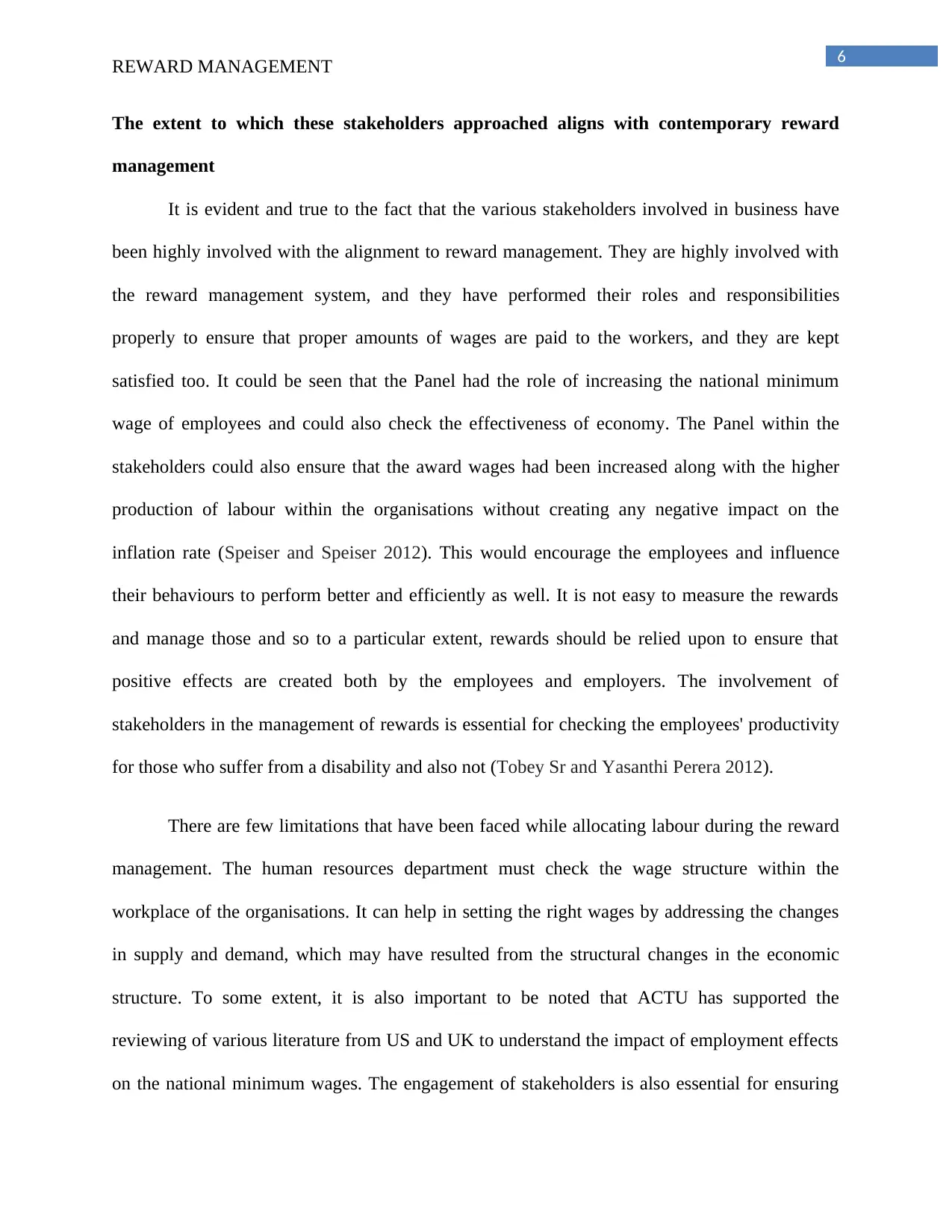
6
REWARD MANAGEMENT
The extent to which these stakeholders approached aligns with contemporary reward
management
It is evident and true to the fact that the various stakeholders involved in business have
been highly involved with the alignment to reward management. They are highly involved with
the reward management system, and they have performed their roles and responsibilities
properly to ensure that proper amounts of wages are paid to the workers, and they are kept
satisfied too. It could be seen that the Panel had the role of increasing the national minimum
wage of employees and could also check the effectiveness of economy. The Panel within the
stakeholders could also ensure that the award wages had been increased along with the higher
production of labour within the organisations without creating any negative impact on the
inflation rate (Speiser and Speiser 2012). This would encourage the employees and influence
their behaviours to perform better and efficiently as well. It is not easy to measure the rewards
and manage those and so to a particular extent, rewards should be relied upon to ensure that
positive effects are created both by the employees and employers. The involvement of
stakeholders in the management of rewards is essential for checking the employees' productivity
for those who suffer from a disability and also not (Tobey Sr and Yasanthi Perera 2012).
There are few limitations that have been faced while allocating labour during the reward
management. The human resources department must check the wage structure within the
workplace of the organisations. It can help in setting the right wages by addressing the changes
in supply and demand, which may have resulted from the structural changes in the economic
structure. To some extent, it is also important to be noted that ACTU has supported the
reviewing of various literature from US and UK to understand the impact of employment effects
on the national minimum wages. The engagement of stakeholders is also essential for ensuring
REWARD MANAGEMENT
The extent to which these stakeholders approached aligns with contemporary reward
management
It is evident and true to the fact that the various stakeholders involved in business have
been highly involved with the alignment to reward management. They are highly involved with
the reward management system, and they have performed their roles and responsibilities
properly to ensure that proper amounts of wages are paid to the workers, and they are kept
satisfied too. It could be seen that the Panel had the role of increasing the national minimum
wage of employees and could also check the effectiveness of economy. The Panel within the
stakeholders could also ensure that the award wages had been increased along with the higher
production of labour within the organisations without creating any negative impact on the
inflation rate (Speiser and Speiser 2012). This would encourage the employees and influence
their behaviours to perform better and efficiently as well. It is not easy to measure the rewards
and manage those and so to a particular extent, rewards should be relied upon to ensure that
positive effects are created both by the employees and employers. The involvement of
stakeholders in the management of rewards is essential for checking the employees' productivity
for those who suffer from a disability and also not (Tobey Sr and Yasanthi Perera 2012).
There are few limitations that have been faced while allocating labour during the reward
management. The human resources department must check the wage structure within the
workplace of the organisations. It can help in setting the right wages by addressing the changes
in supply and demand, which may have resulted from the structural changes in the economic
structure. To some extent, it is also important to be noted that ACTU has supported the
reviewing of various literature from US and UK to understand the impact of employment effects
on the national minimum wages. The engagement of stakeholders is also essential for ensuring
Paraphrase This Document
Need a fresh take? Get an instant paraphrase of this document with our AI Paraphraser
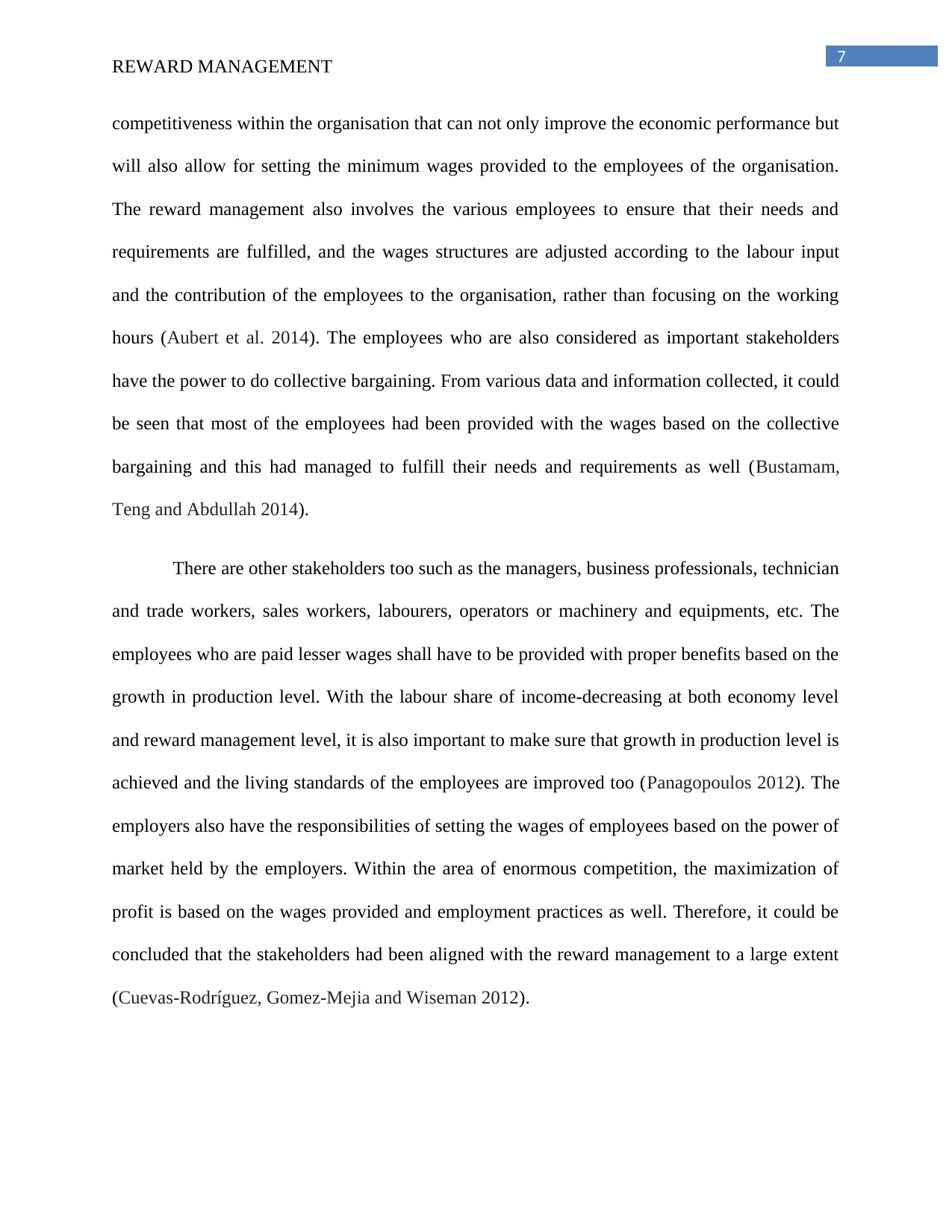
7
REWARD MANAGEMENT
competitiveness within the organisation that can not only improve the economic performance but
will also allow for setting the minimum wages provided to the employees of the organisation.
The reward management also involves the various employees to ensure that their needs and
requirements are fulfilled, and the wages structures are adjusted according to the labour input
and the contribution of the employees to the organisation, rather than focusing on the working
hours (Aubert et al. 2014). The employees who are also considered as important stakeholders
have the power to do collective bargaining. From various data and information collected, it could
be seen that most of the employees had been provided with the wages based on the collective
bargaining and this had managed to fulfill their needs and requirements as well (Bustamam,
Teng and Abdullah 2014).
There are other stakeholders too such as the managers, business professionals, technician
and trade workers, sales workers, labourers, operators or machinery and equipments, etc. The
employees who are paid lesser wages shall have to be provided with proper benefits based on the
growth in production level. With the labour share of income-decreasing at both economy level
and reward management level, it is also important to make sure that growth in production level is
achieved and the living standards of the employees are improved too (Panagopoulos 2012). The
employers also have the responsibilities of setting the wages of employees based on the power of
market held by the employers. Within the area of enormous competition, the maximization of
profit is based on the wages provided and employment practices as well. Therefore, it could be
concluded that the stakeholders had been aligned with the reward management to a large extent
(Cuevas‐Rodríguez, Gomez‐Mejia and Wiseman 2012).
REWARD MANAGEMENT
competitiveness within the organisation that can not only improve the economic performance but
will also allow for setting the minimum wages provided to the employees of the organisation.
The reward management also involves the various employees to ensure that their needs and
requirements are fulfilled, and the wages structures are adjusted according to the labour input
and the contribution of the employees to the organisation, rather than focusing on the working
hours (Aubert et al. 2014). The employees who are also considered as important stakeholders
have the power to do collective bargaining. From various data and information collected, it could
be seen that most of the employees had been provided with the wages based on the collective
bargaining and this had managed to fulfill their needs and requirements as well (Bustamam,
Teng and Abdullah 2014).
There are other stakeholders too such as the managers, business professionals, technician
and trade workers, sales workers, labourers, operators or machinery and equipments, etc. The
employees who are paid lesser wages shall have to be provided with proper benefits based on the
growth in production level. With the labour share of income-decreasing at both economy level
and reward management level, it is also important to make sure that growth in production level is
achieved and the living standards of the employees are improved too (Panagopoulos 2012). The
employers also have the responsibilities of setting the wages of employees based on the power of
market held by the employers. Within the area of enormous competition, the maximization of
profit is based on the wages provided and employment practices as well. Therefore, it could be
concluded that the stakeholders had been aligned with the reward management to a large extent
(Cuevas‐Rodríguez, Gomez‐Mejia and Wiseman 2012).
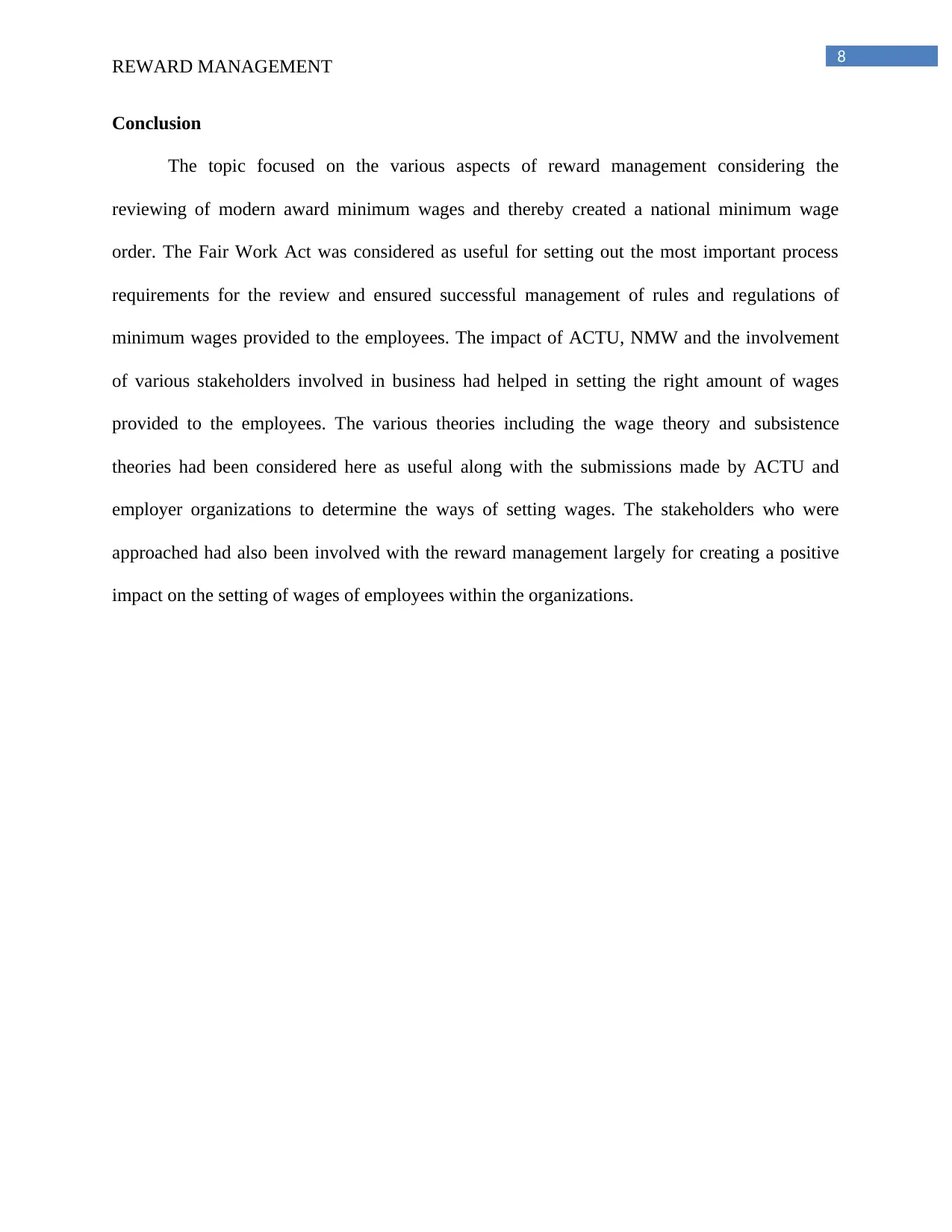
8
REWARD MANAGEMENT
Conclusion
The topic focused on the various aspects of reward management considering the
reviewing of modern award minimum wages and thereby created a national minimum wage
order. The Fair Work Act was considered as useful for setting out the most important process
requirements for the review and ensured successful management of rules and regulations of
minimum wages provided to the employees. The impact of ACTU, NMW and the involvement
of various stakeholders involved in business had helped in setting the right amount of wages
provided to the employees. The various theories including the wage theory and subsistence
theories had been considered here as useful along with the submissions made by ACTU and
employer organizations to determine the ways of setting wages. The stakeholders who were
approached had also been involved with the reward management largely for creating a positive
impact on the setting of wages of employees within the organizations.
REWARD MANAGEMENT
Conclusion
The topic focused on the various aspects of reward management considering the
reviewing of modern award minimum wages and thereby created a national minimum wage
order. The Fair Work Act was considered as useful for setting out the most important process
requirements for the review and ensured successful management of rules and regulations of
minimum wages provided to the employees. The impact of ACTU, NMW and the involvement
of various stakeholders involved in business had helped in setting the right amount of wages
provided to the employees. The various theories including the wage theory and subsistence
theories had been considered here as useful along with the submissions made by ACTU and
employer organizations to determine the ways of setting wages. The stakeholders who were
approached had also been involved with the reward management largely for creating a positive
impact on the setting of wages of employees within the organizations.
⊘ This is a preview!⊘
Do you want full access?
Subscribe today to unlock all pages.

Trusted by 1+ million students worldwide
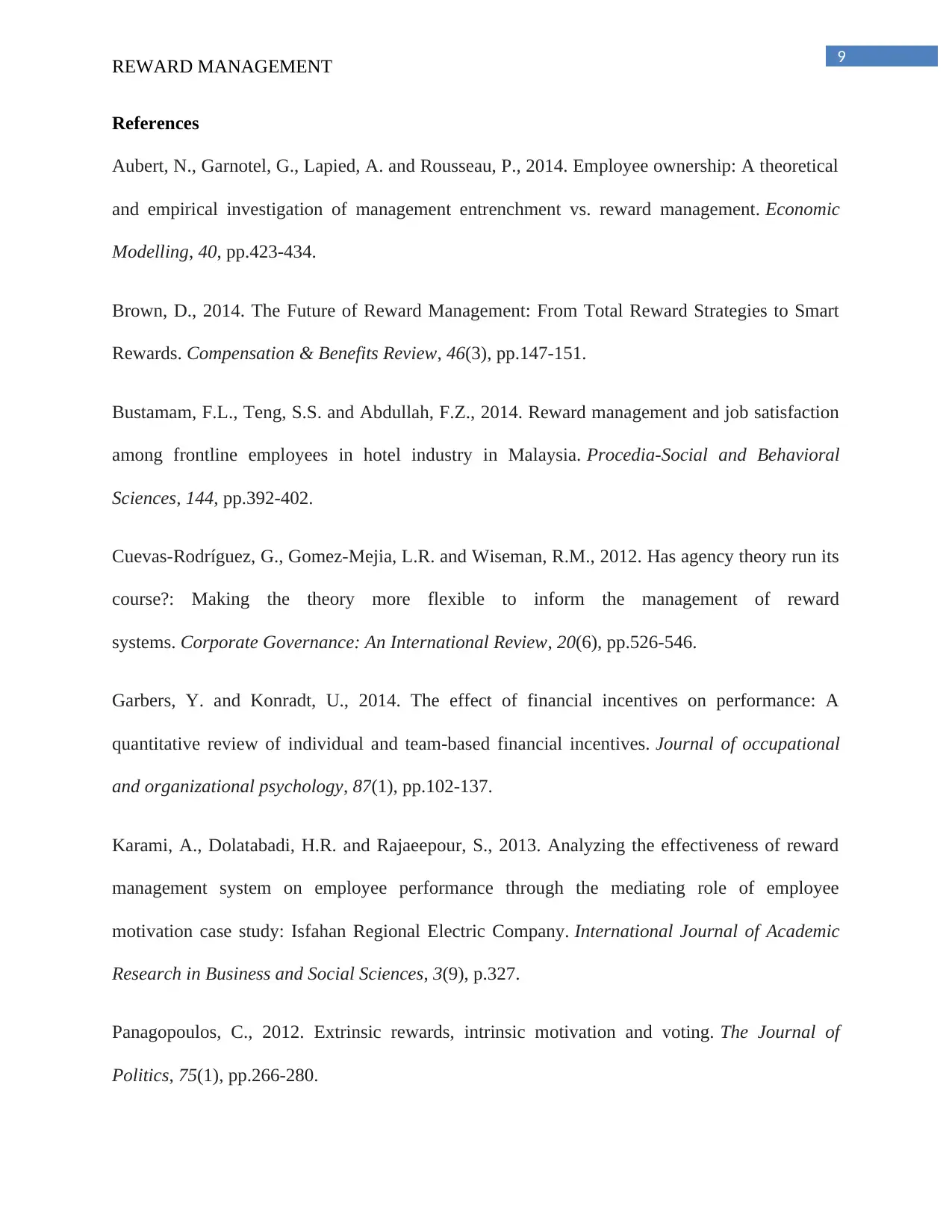
9
REWARD MANAGEMENT
References
Aubert, N., Garnotel, G., Lapied, A. and Rousseau, P., 2014. Employee ownership: A theoretical
and empirical investigation of management entrenchment vs. reward management. Economic
Modelling, 40, pp.423-434.
Brown, D., 2014. The Future of Reward Management: From Total Reward Strategies to Smart
Rewards. Compensation & Benefits Review, 46(3), pp.147-151.
Bustamam, F.L., Teng, S.S. and Abdullah, F.Z., 2014. Reward management and job satisfaction
among frontline employees in hotel industry in Malaysia. Procedia-Social and Behavioral
Sciences, 144, pp.392-402.
Cuevas‐Rodríguez, G., Gomez‐Mejia, L.R. and Wiseman, R.M., 2012. Has agency theory run its
course?: Making the theory more flexible to inform the management of reward
systems. Corporate Governance: An International Review, 20(6), pp.526-546.
Garbers, Y. and Konradt, U., 2014. The effect of financial incentives on performance: A
quantitative review of individual and team‐based financial incentives. Journal of occupational
and organizational psychology, 87(1), pp.102-137.
Karami, A., Dolatabadi, H.R. and Rajaeepour, S., 2013. Analyzing the effectiveness of reward
management system on employee performance through the mediating role of employee
motivation case study: Isfahan Regional Electric Company. International Journal of Academic
Research in Business and Social Sciences, 3(9), p.327.
Panagopoulos, C., 2012. Extrinsic rewards, intrinsic motivation and voting. The Journal of
Politics, 75(1), pp.266-280.
REWARD MANAGEMENT
References
Aubert, N., Garnotel, G., Lapied, A. and Rousseau, P., 2014. Employee ownership: A theoretical
and empirical investigation of management entrenchment vs. reward management. Economic
Modelling, 40, pp.423-434.
Brown, D., 2014. The Future of Reward Management: From Total Reward Strategies to Smart
Rewards. Compensation & Benefits Review, 46(3), pp.147-151.
Bustamam, F.L., Teng, S.S. and Abdullah, F.Z., 2014. Reward management and job satisfaction
among frontline employees in hotel industry in Malaysia. Procedia-Social and Behavioral
Sciences, 144, pp.392-402.
Cuevas‐Rodríguez, G., Gomez‐Mejia, L.R. and Wiseman, R.M., 2012. Has agency theory run its
course?: Making the theory more flexible to inform the management of reward
systems. Corporate Governance: An International Review, 20(6), pp.526-546.
Garbers, Y. and Konradt, U., 2014. The effect of financial incentives on performance: A
quantitative review of individual and team‐based financial incentives. Journal of occupational
and organizational psychology, 87(1), pp.102-137.
Karami, A., Dolatabadi, H.R. and Rajaeepour, S., 2013. Analyzing the effectiveness of reward
management system on employee performance through the mediating role of employee
motivation case study: Isfahan Regional Electric Company. International Journal of Academic
Research in Business and Social Sciences, 3(9), p.327.
Panagopoulos, C., 2012. Extrinsic rewards, intrinsic motivation and voting. The Journal of
Politics, 75(1), pp.266-280.
Paraphrase This Document
Need a fresh take? Get an instant paraphrase of this document with our AI Paraphraser
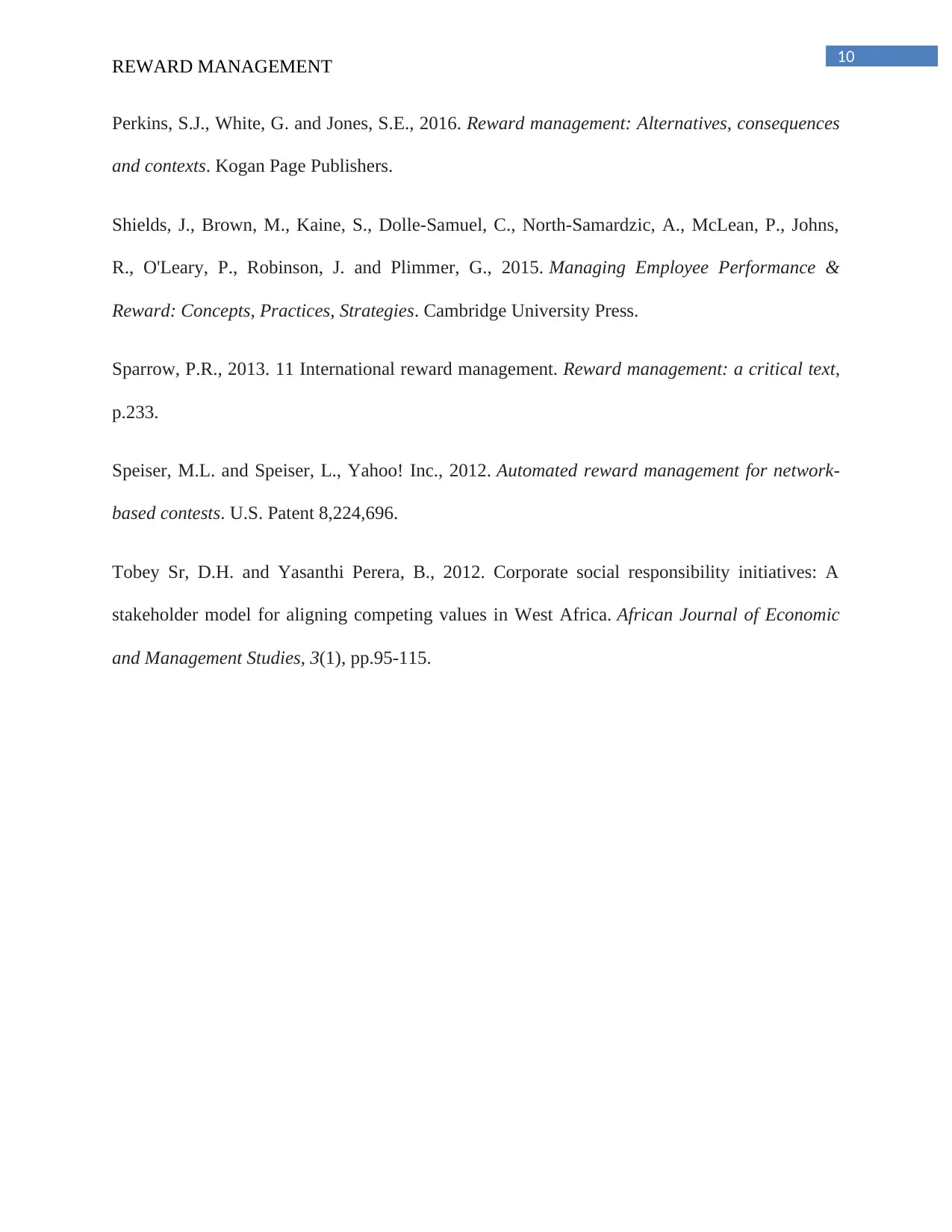
10
REWARD MANAGEMENT
Perkins, S.J., White, G. and Jones, S.E., 2016. Reward management: Alternatives, consequences
and contexts. Kogan Page Publishers.
Shields, J., Brown, M., Kaine, S., Dolle-Samuel, C., North-Samardzic, A., McLean, P., Johns,
R., O'Leary, P., Robinson, J. and Plimmer, G., 2015. Managing Employee Performance &
Reward: Concepts, Practices, Strategies. Cambridge University Press.
Sparrow, P.R., 2013. 11 International reward management. Reward management: a critical text,
p.233.
Speiser, M.L. and Speiser, L., Yahoo! Inc., 2012. Automated reward management for network-
based contests. U.S. Patent 8,224,696.
Tobey Sr, D.H. and Yasanthi Perera, B., 2012. Corporate social responsibility initiatives: A
stakeholder model for aligning competing values in West Africa. African Journal of Economic
and Management Studies, 3(1), pp.95-115.
REWARD MANAGEMENT
Perkins, S.J., White, G. and Jones, S.E., 2016. Reward management: Alternatives, consequences
and contexts. Kogan Page Publishers.
Shields, J., Brown, M., Kaine, S., Dolle-Samuel, C., North-Samardzic, A., McLean, P., Johns,
R., O'Leary, P., Robinson, J. and Plimmer, G., 2015. Managing Employee Performance &
Reward: Concepts, Practices, Strategies. Cambridge University Press.
Sparrow, P.R., 2013. 11 International reward management. Reward management: a critical text,
p.233.
Speiser, M.L. and Speiser, L., Yahoo! Inc., 2012. Automated reward management for network-
based contests. U.S. Patent 8,224,696.
Tobey Sr, D.H. and Yasanthi Perera, B., 2012. Corporate social responsibility initiatives: A
stakeholder model for aligning competing values in West Africa. African Journal of Economic
and Management Studies, 3(1), pp.95-115.
1 out of 11
Related Documents
Your All-in-One AI-Powered Toolkit for Academic Success.
+13062052269
info@desklib.com
Available 24*7 on WhatsApp / Email
![[object Object]](/_next/static/media/star-bottom.7253800d.svg)
Unlock your academic potential
Copyright © 2020–2026 A2Z Services. All Rights Reserved. Developed and managed by ZUCOL.





